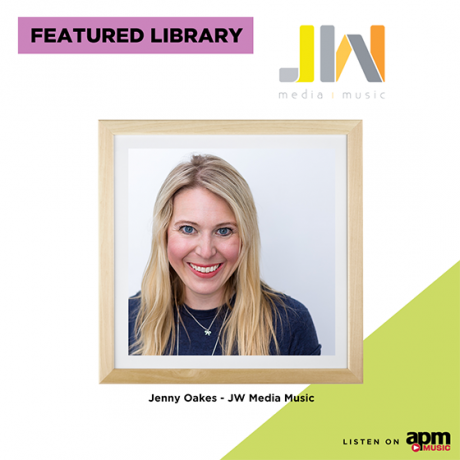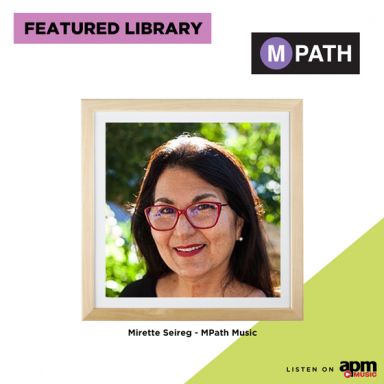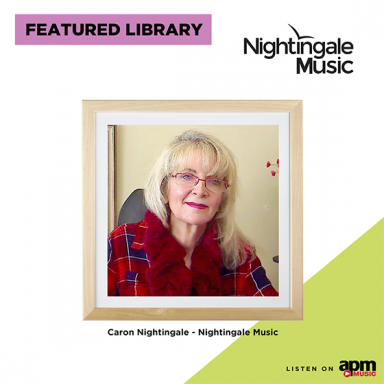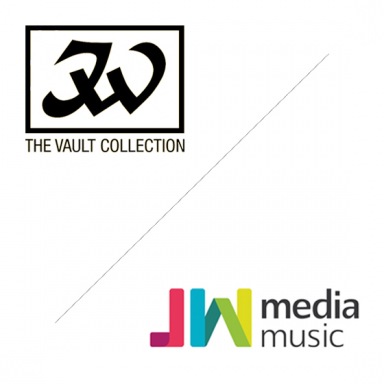Introducing Jenny Oakes, the Mastermind Director Behind JW Media Music
Library Owners: Women's History Month Edition
Introducing Jenny Oakes, the Mastermind Director Behind JW Media Music and Ravenwood Production Music
- Words by KC Orcutt
As exemplified throughout the past twenty years and counting, Jenny Oakes has been bringing something extremely special to the field of production music: true passion.
Whether she's expertly overseeing all facets of an album's creation, assisting both emerging and established composers alike or sharing her breadth of knowledge with others, Jenny works tirelessly to ensure that every project she's involved with is one of quality, purpose and heart. Currently dividing her time between JW Media Music (where she serves as the CEO and Managing Director), and Ravenwood Music (where she works as a director), Jenny has been an integral part of over 200 albums, while also expertly steering both companies in a direction that aims to make an incredible impact on the production music landscape at large.
What can be found at the center of Jenny's multifaceted career is a genuine intention to do her part in guiding the industry toward becoming a more welcoming and inclusive space as a whole. Whether she is encouraging musicians from historically underrepresented backgrounds to get involved with composing and other aspects of production music, sharing resources or helping raise awareness of the inexcusable disparities woven deep into the industry's history, Jenny leads by example, using her platform as the head of JW Media Music to champion amazing music and creativity from a diverse array of collaborators.
In 2019, the internationally renowned company released All Woman, an album composed and crafted entirely by women ranging in age from 18 to 55 years old. The project further affirmed Jenny's mission to welcome more women into the industry, with several of the album's participants expressing from their point of view that they hadn't felt as supported to submit music to libraries in the past. While the fight to achieve gender parity is far from over, actively challenging the status quo to examine its issues from the top down is a key part of the conversation. Over the years, Women's History Month has emerged both as an opportunity to continue discussing how to course-correct some of the problems caused by music being a male-dominant field and a way to amplify the achievements of those who identity as women.
"Women’s History Month really resonates with me as I have always been inspired by the example of my great grandmother, one of the original Suffragettes in Islington, London in 1906!" Jenny shared, going on to explain how she approaches the annual month-long exploration and celebration of the vital role of women throughout history.
"For me, this month gives me an extra opportunity to encourage women to join industries which they may feel may not be accessible to them," she continued. "This is so important in our industry as we know that here in the UK only 17% of PRS members identify as female. This is a time to celebrate and educate ourselves on how important it is for women to have a voice in music composition for film and television. We can champion our female composers, and by raising awareness, this becomes the norm and more young women will see this as an exciting career option to pursue. As a mother of a boy and a girl, and a CEO, I feel I have a responsibility to ensure that my library has a diverse range of composers without compromising on quality. Let's highlight the female composers and the women who make a difference to this brilliant creative industry we work in."
During an in-depth interview with APM Music, Jenny shared more about what the production music industry at large can do to enact tangible change, while also sharing more about how she got her start, her favorite part of the collaboration process and what’s in store next for JW Media Music.
Can you walk us through what an average day may look like out of your workweek?
Well, nothing is really average at the moment [Laughs]. A day for us could be anything like going through an album that we're working on, such as talking about the artwork, going over the metadata that's attached to those tracks, discussing how we want to market it. Then, we'll have a look at what albums we want to release and go over why we want to release them. Really, a big chunk of the day will be spent doing music searches, registering works and all the admin that goes with it. Luckily, because we're not a big corporate company, we can be fluid in what we're doing. We can have lots of chats with composers and musicians and clients, which is quite fun. We'll fit that around everyone's school hours and working hours and everything else.
How did you get into the world of production music?
I kind of fell into it, really. When I was at university, I was part of the group that set up and started one of the first student radio stations in the UK. I was given the job as head of music, mainly based on the fact I had the biggest CD collection and vinyl collection out of any of the students that were there that were interested in doing it [Laughs]. That opened this brilliant idea of music and going to gigs in a different capacity, from just enjoying it as a consumer. So from there, I left university and joined HMV, which is a big record store in the UK, as a graduate manager. This helped me realize that I absolutely loved working in music, but I decided that retail probably wasn't the right thing to want to deal with, such as the long hours and weekend shifts, when you're in your 20s and want to go out [Laughs].
I sought out a job doing music searches at JW, where really what they wanted was somebody who had a really good knowledge of music. Something that you get from working in a record store is a great knowledge of music across every genre that you can possibly have, where there's all these different people that come in and want to know everything from a classical reference to a current top 10 hit. So I got the job with JW and absolutely loved it. I really enjoyed the client side of going out and meeting people and answering the briefs that came in. That's where it all started. I didn't set out to say, I'm going to work in production music, but that's what I ended up doing. I had a good knowledge of what happens in TV and films. My dad was a film producer, so I always had media around me. He'd always be very much let's sit and watch this film or this TV show, and he'd be talking to me about the creative elements of post-production and color and how they put things together. Because he did some editing work, he'd also touch on how music was chosen. So working in production music wasn't an alien concept or something that I didn't know about. It was always in my life; this kind of love of media and TV and film and music, and how the two join together. And I always thought, how brilliant.
Looking back throughout your storied career, I know there are many possible answers to this question, but what would you say is a project you're really proud of?
One project that has been really, really exciting was doing the All Woman album last year. That was a passion project from the start. It was great to be able to focus on something that was important to me, to try and encourage women into the industry and work on the album.
It's difficult to blow your own trumpet of things you're proud of, isn't it? [Laughs] I was always quite proud that I was one of the only women that sat on the MCPS committee for production music. I was proud of the fact that I got to be one of the only female graduate managers for HMV at the time. I've always been very much caught up with the thought that you should never let your gender stop you from doing things that you want to do. You shouldn't look at it like that; if you want to do it, just go and do that. Your gender shouldn't stop you. And if you are the only woman in the room, so what?
What has the feedback been like since releasing the All Woman album?
The feedback was amazing. What I got from it was that, suddenly, I had more female composers than I've ever had before coming and sending me samples of their work. The message that I wanted to get across is: don't let being a woman or having a child or being later in life or being a different background or anything else stop you from being able to get into this industry, which is dominated, especially in the UK, by men. I don't feel that any of those things should be a barrier or a reason to overlook someone. Hopefully, we got that message across quite clearly and quite succinctly.
It took us quite a long time to complete the album. We actually started talking about it in 2018. In 2019, it became more of a reality. We really wanted to encourage people, and if there were young composers that we were working with, we'd say, Okay, take your time. There's still going to be an appetite for this in a bit. So if you need longer, or if you need hand-holding through this process, let's go at the speed that you're comfortable with. I think that worked.
We ended up with a really good diverse album of music from all different backgrounds and all different genres. We had an 18-year-old to a 55-year-old, [the latter of which] had been a young pop star and then had children, lost her confidence and stopped writing music, even though she'd been quite successful in the '80s. She's now recording music again, and to be able to give someone that opportunity is so rewarding. She was explaining, Well, I feel really blocked out of this market. How can I, as what she sees is a middle-aged woman, get into this cool, trendy market. I'd say, Your music will speak for you.
In what ways can the industry at large encourage more women to become composers, and tangibly support their careers in doing so?
I think what needs to happen, is that it needs to happen at very much a grassroots level. It needs to happen at a place of education, where the children are younger (such as secondary school age in the UK), and even when they're at primary age, we need to encourage them in that they can do any of these jobs, and there is a place for that. The only way we'll be able to get that idea across is if they see women being successful in roles as composers so that there is a precedent set for them and so that they feel they can enter that profession as well. I think as soon as we start educating and changing people's mindsets, we'll see change.
This isn't just about women in our industry, writing music; this is about encouraging women to be producers and editors and mastering engineers. All of those components need to have more women in them. I think it's very that even when you talk to music teachers -- for example, my daughter's ten -- and there's this underlying notion that the girls will sing and play piano and the boys will play guitar. I think that has to change. I think that has to do with how there aren't really that many role models or well-known female composers for younger musicians to aspire and look up to. I think as soon as you get more visible role models, then you'll encourage more women into it.
That’s really interesting to have that perspective and that example of how social conditioning begins really so early on. In what ways does something similar manifest later on in life, particularly in the production music industry? How can we combat that?
In terms of jobs in the production music industry, we have to stop thinking that the promo roles should go to women and the management roles should go to men, which has always traditionally been the case. It's important to give the young staff that are coming in the opportunity to learn all the other parts of the business that perhaps they haven't had the opportunity to learn. They could've been steered down a different path when they're choosing their education because it's more female focused, for example. What I found quite interesting is if you use the parallel of something like the nursing profession, where there are more women than men. They're trying very hard to encourage more men into it, because it's about caring and therefore seen as a very "female" profession. But who is to say that men can't be caring? They need to encourage more people into all different sorts of career paths. I think, once you see everybody doing different jobs and the roles are not viewed as gender specific, that's when you'll start seeing change.
One of the things that I feel very strongly about is the composer that you choose to work with shouldn't be because of their gender or their skin color. It should be because they're the right person for the job. I don't believe any woman would want to be chosen for a role just because of any of those other attributes. They want to have it because they should be there on their terms, because they've worked for it and because they're good at it. When you look at female composers in the industry, you see how many tend to do things like being vocalists or playing piano, cello or oboe; they're not the ones that have got the guitar or the ones that are working in hip-hop. Just generally, if you have a look, and you start thinking about it, it's really interesting. When talking to some of the women, they'll say, I did feel more comfortable because piano felt like more of the thing that I should be doing. Things are changing in terms of women and people of color being accepted into our industry and certainly needs to happen in the UK.
I’m sure you’ve seen countless examples of these shifts and changes first-hand throughout your career, especially in more recent years.
It's an exciting time to run a production music library, especially from the point of view of being a woman in the industry. I've gone from sitting on a committee for PRS where I was the only woman in a group of twenty men to now seeing some level of equality between the amount of men and women in that room. That's a really slow, but interesting shift that's only really happened in the last couple of years. You have to be a director of a company or a manager in order to be able to be voted on to this group. I think it just showed that there weren't very many women who were in high enough positions within production music catalogs to be able to be accepted on that. So now that there are more women, it's great because you get that different perspective.
What are some words of wisdom you'd like to pass along to someone first starting out in your field?
For me, coming across as a music publisher, the thing that I found really offencing is people that say, I can do anything, I can write anything for anyone. Name the genre and I'll send it. I personally prefer people that say: This is what I write. I write hip-hop, and I can do it really well. Don't ask me to go write for a film score, because that's not my thing. I would much rather have a really good album from someone who's really passionate about one area of focus than someone that can say, yeah I'll try anything. It makes me think they don't have that passion. I think if someone really loves the genre of music, you can hear it in production music they're writing. That's when you have production music that is really original and different and creative and not pastiche. If they're just trying to write anything, because they're a good competent musician, what ends up happening is they'll go and listen to lots of music that sound like that and don't come up with any original ideas. But if it's their genre, you'll get something which is outstanding, and could be easily released as a commercial track.
What would you say is your favorite part of the creative/collaborative process and being involved in the making of so many different, exciting albums?
I love all of it actually. I tend to leave the composer to do the musical part because I feel if I get too involved and start putting my two cents in, it takes away from their track and their vision. I can tell them whether I think it will work and if it's good, but I don't tend to sit there and start breaking down their track for them, because that's not my work. I absolutely love working on the artwork and strategizing how we're going to market it and what we're going to title it and where we're going to pitch it and what keywords we should be adding to make that music come alive with what we're trying to do. I think that has to be part of the whole package. One of the things that we've been doing in the last couple of years is working with local artists and up-and-coming artists, rather than just picking images off Shutterstock. We are actually trying to talk to artists and say, this is another way to get your artwork out in the world. Perhaps we could collaborate and do something together or you could come up with something. It's quite a good visual aid. I usually have an idea in my head of what it would go with and what colors I'm seeing when I listen to it.
What does this next chapter have in store for JW Media?
We've always tried to record music because it's good music, and it's interesting music. We never wanted to just fill shelf space. We've always wanted to do an album because it's worth doing. Sometimes that works. Sometimes it doesn't, because it's not the most commercial album in the world but everything is being done with passion and excitement and enthusiasm attached to it. JW Media has always been an independent company, so we're focused on continuing to take it in the direction we want to take it in.
What are some upcoming projects to look out for?
We just released an album called Human by Rosey Chan. She's a commercial pianist who is absolutely fantastic. The album cover we commissioned is an oil painting by an artist named Naomi Jayne. It's quite beautiful. We're also recording with an up-and-coming London pop artist, Chashe. Since we signed her to write the library album, she signed a commercial pop deal, so that should be interesting. She's got a beautiful, beautiful voice. We also just finished a brilliant album with a commercial DJ called Remulak. He reimagined some of our early archive materials and put a real lofi hip-hop feel to them. It's got this modern-but-retro feel to it, which is great. The album also has a really great cover by an artist named Gem Ainsworth, who did a fantastic job with it. These are the key projects I'm working on at the moment.
We've got three or more currently in production, but they're in the very early stages. We've had to hold back some of the big recording projects because of Covid-19 impacting when we can get into the studio. Additionally, each month, we also release about 20 of our archive recordings where we've remastered them up to the current broadcast standards. These are a strange collection recorded for what was happening on TV in the '50s. So on one side, you can have one style of music and the other side of the LP, there's something completely different and you're like what on earth am I going to call this?! [Laughs]
I can tell from speaking with you that you really do love your job, which is genuinely refreshing to hear. What about the production music industry helps you stay inspired and keep going?
I do love it! I think being in production music is one of the only jobs where you get to work with and record all different styles of music. You can choose what you want to work with and you get to meet some fantastic composers from all different backgrounds. You can be going out and seeing clients making TV shows one minute, and then the next you can be speaking to an ad editor. You can have all of these different experiences in production music. You don't tend to have that in a lot of careers. I always say, especially to the younger women that are coming into the industry, working in production music or being a composer is possibly one of the only jobs that you can do where it doesn't matter if you go off and have children. You can still write music around school drop offs and collections and everything else that comes with parenting. The industry doesn't change so much that if you take some time out and come back, you haven't missed a whole change in what's happening. I think women need to understand that while it is difficult to balance a family and keep your career going, it is possible if that's what you want.
I think, especially with the pandemic, working remotely has become more acceptable. I think you have to be open-minded in business and if you want really good women on staff, you have to make it possible for women to be able to do all the other things that they might want to do. If companies make it easy for women, they're making it easy for men and then you get gender parity because you can share the workload. There isn't the expectation that the man works, and the woman stays at home, because the expectation is that both can be involved in doing what needs to get done because the employer is being flexible. That's what businesses need to be looking at going forward.




